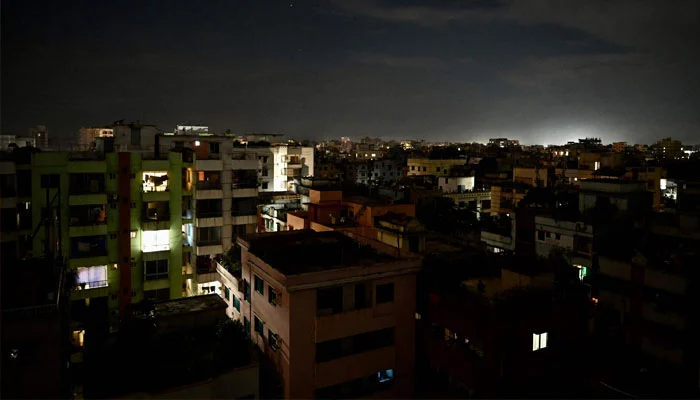ISLAMABAD: A study on the nationwide power outage that occurred last year revealed that the nation’s power transmission system is being operated based only on verbal orders because appropriate standard operating procedures (SOPs) are not in place.
According to the assessment on the 20-hour power outage that struck the country on January 23, 2023, the electric power transmission infrastructure, which transfers electricity worth Rs 3,000 billion annually, is deemed “highly vulnerable.”
The inquiry committee, however, has remarkably spared the heads of the highest ranking officials in the system and found three minor officers accountable for the power outage that resulted in a staggering loss of more than Rs80 billion.
Junior executives of the National Power Control Centre (NPCC), comprising two deputy managers, one shift in-charge, and one manager,
have been used as props. To protect his own skin, Zain Ali, the National Power Control System’s Deputy Managing Director (DMD), has resigned.
The federal cabinet demanded severe measures against those responsible for the nationwide power outage as soon as it occurred.
On January 23, 2023, there was a national power outage. It took almost 20 hours for the NTDC to fully restore electricity to the whole network.
A committee was formed with the following members: Husnain Arshad, Manager (C&RA) o/o CLO NTDC; Taqi-Ud-Din, Chief Engineer (Substation Design); Munawar Hussain, General Manager (PA) NTDC; and Qaiser Khan, Deputy Managing Director (P&E) NTDC.
Additionally, the Board of Directors instructed the aforementioned four-member committee to hold investigations of the officers,
Palwasha Khan, Deputy Manager (Shutdown), Farooq Jan, Deputy Manager/Shift Co-Supervisor, Ateeq Ahmed, Assistant Manager/Shift Engineer, Mubashar Hussain, Deputy Manager/Shift Supervisor, and Aijaz Ali, Chief Engineer (Network Operation)/Manager Power Control.
In compliance with the regulations, on December 21, 2023, summonses were sent to the accused officers, directing them to come before the committee on December 26, 2023, so that Rule-6 of the Rules could be followed.
Consequently, on December 26, 2023, three of the accused police personally appeared before the inquiry committee, while on December 27, 2023, the remaining accused officers were viewed via a video link.
After reading the charge sheet/statement of allegations, the officer’s written response, and his defense reply reaffirmed during the personal hearing, the committee noted that, according to the inquiry report, the officer was in charge of supervising 220 and 500kV transmission network operations and that, in order to take appropriate action, he had to notify his superiors of the open position of the 500kV Moro-Rahim Yar Khan transmission line first thing in the morning.
The committee did find, however, that his superiors were well aware of the 500kV Moro-Rahim Yar Khan transmission line’s current situation.
The shift supervisor should have given the shift engineer instructions on system studies and their application for transmission line load ability/stability limits under various network operating conditions.
His claim that he never received a SOP was also supported by the previous inquiry committee that the BoD NTDC established. Page 16 of the report states that he may not be held accountable because he was an operator following the shift supervisor’s instructions. According to the committee, he might not be held accountable.
On December 26, 2023, Mubashar Hussain, the Deputy Manager/Shift Supervisor, made a personal appearance before the investigation committee. He has admitted that the 500kV Jamshoro-Dadu transmission line interruption made the system inadequate.
He added that there is no standard operating procedure (SOP) for loading and switching transmission lines, and that the on-duty shift supervisor makes all of these decisions.
, but he was ignorant of stability and load limits. He should have gotten these documents/instructions in his capacity as shift supervisor. Furthermore, he ought to have taken into account the possibility that the 500 kV Moro-Rahim Yar Khan transmission line was in an open state prior to injecting wind power.
In light of the aforementioned, the committee accepts the previous investigation committee’s decision that the officer may be held accountable.
On December 26, 2023, Farooq Jan, Deputy Manager/Shift Co-Supervisor, made a personal appearance before the inquiry committee. The officer acknowledged that the PMLTC studies required power flow in the AC corridor to be limited, and he took the initial step to reduce power flow in the AC corridor.
This indicates that the referred inquiry report’s conclusion regarding his inaction is somewhat inaccurate because he did take corrective action during the first portion of the shift. Nevertheless, his input was not noticed throughout the morning procedures.
Considering the aforementioned, this investigation committee concurs with the previous inquiry committee’s finding that the officer might be held partially accountable.
On December 27, 2023, Palwasha Khan, Deputy Manager (Shutdown), the accused, made a personal video link appearance before the inquiry committee at her request. The officer also provided the inquiry committee with a second written response.
On December 27, 2023, Aijaz Ali, the Chief Engineer (Network Operation) and Manager of Power Control, personally appeared via video link before the inquiry committee as an accused party. He was in charge of all network operations as Chief Engineer (Network Operation) and Manager Power Control, the committee has noted after reading the charge sheet and statement of allegations, his written response, and his affirmation of that response during the personal hearing. It was his duty to create the specified operation schedule while considering the economic merit order, system limitations, and related dispatched operations.
After receiving the data from the Chief Engineer (Operational Planning), his office was required to distribute it to the lower office with reference to load ability and stability.
His response does not address the fundamental problem of the operational error that resulted in the over-loading of the remaining AC corridor due to the 500 KV Moro-Rahim Yar Khan transmission line not being closed.
The committee accepts the preceding inquiry committee’s decision that he could be held accountable.







